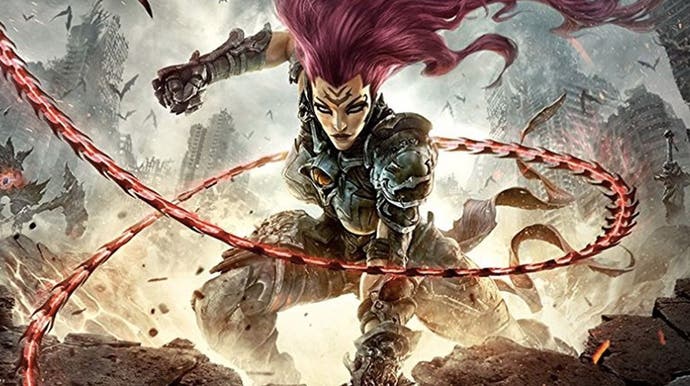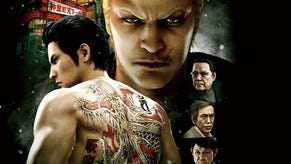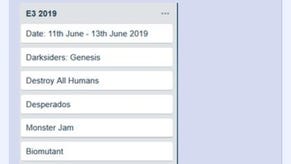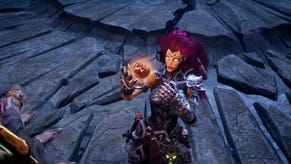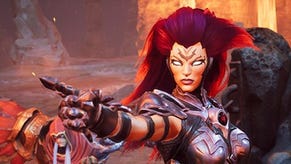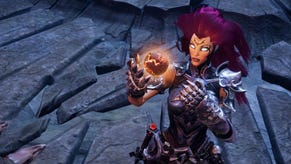Darksiders 3 review - a pale imitation of itself
Apocalypse now.
There's something of the palate cleanser to the faithful hack and slash game. When elsewhere the worlds are getting bigger, the narratives more urgent and the collectables more numerous, games such as Darksiders generally have only one goal: hitting monsters on the noggin. In Darksiders 3, you get to do that once again - and little else besides.
Six years after the last instalment - and some five years since the liquidation of the series' original publisher - Darksiders now has a new-ish publisher and a new-ish developer: THQ Nordic rose out of the ashes of THQ and many of the original Darksiders devs now work at Gunfire Games. The Darksiders sequel we have now is the result of this precarious second lease of life.
Darksiders 2 introduced drastic changes, like the massive inventory, the large number of weapons and the skill tree, to little applause, so part three does away with all of that. Unfortunately Gunfire Games goes about the trim like an overzealous hairstyling trainee who didn't know when to stop, leaving us with a game that just barely skirts the edges of boredom at times.
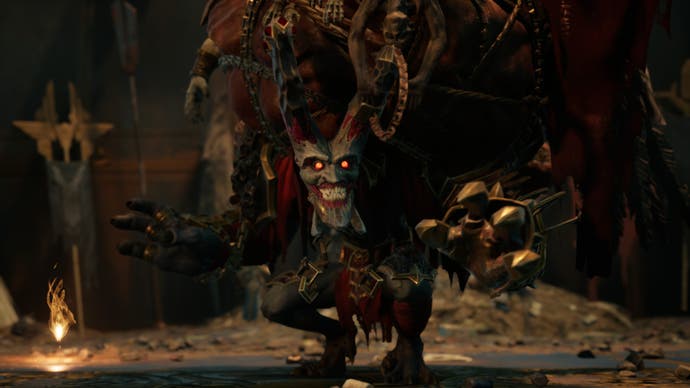
The story, what little there is, runs parallel to its predecessor: War is charged by the Council for unleashing the apocalypse, Death is out to prove his brother's innocence and Strife is, uh, busy dealing with other things. Fury is left with the task of capturing the seven deadly sins down on earth. Essentially, it's cleanup duty.
You're introduced to Fury's horse and her obligatory sidekick, only to never hear from them again, or much else for that matter. As you walk around, only solving a puzzle or beating a boss will result in small exchanges. Sure, most of dialogue in Darksiders has always been quippy one-liners, but Fury's often-teased redemption arc takes her from an absolute caricature to just about bearable.
At the beginning she's angry, she's surly, she wants to kill. She will gradually tone that urge down to admit that maybe not everyone should die. It is not exactly interesting character development. Add to that the game's penchant for cracking jokes about itself, like remarking on how boring the environs are and how obvious the solution to a puzzle is, and the whole thing can be so awkward that the silence becomes preferable.
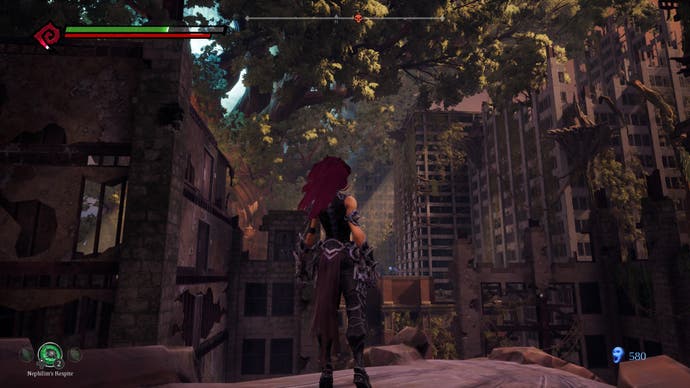
Combat has also been slimmed to just short of the bare minimum. Initially Fury has just her whip, joined slowly throughout the game by hollows. Each hollow gives you a weapon and charged attack imbued with a certain element while also changing the way your jump behaves. The force hollow gives some extra crunch to your punch, the fire hollow lets you set things on fire and so forth. You can collect weapon enhancements and upgrade weapon damage, but since regular attacks and the familiar wrath and havoc forms are the only things in your arsenal, every fight soon begins to feel the same.
In the lead-up to Darksiders 3, Gunfire Games has said time and time again that this was a deliberate decision from a narrative and character development standpoint: out of the three series protagonists, Fury is the fairer sex, more of a magician and someone who needs to fight at range. In practice, though, this means you get boxed in by enemies who themselves have only a few moves. Countering their attacks at the right moment is key, as is wrestling the camera, the fast, straightforward combat given an unnecessary edge thanks to how awkwardly it plays out. Thank heavens for the great sound design, then, as it alerts you to enemies and when to dodge their attacks.
It all plays towards a claustrophobia that pervades Darksiders 3. You backtrack the small environment often, typically after receiving a new hollow and thus a new jump which allows you to reach new places. While there is no map, most of the time it's easy enough to navigate the world, until you defeat a boss and have to find a new way via an old area. The compass only has an icon for whatever deadly sin is closest.
I generally agree with the notion that mini maps are a tad outdated, but as someone who gets lost in her own neighbourhood, finding the way around in Darksiders 3 wasn't so much a fun challenge as a frustrating experience in which the compass would steadily spin me in circles. Elsewhere, the promised stronger focus on puzzles and platforming did not take place - too often it's just a matter of pressure plate puzzles and lowering bridges.
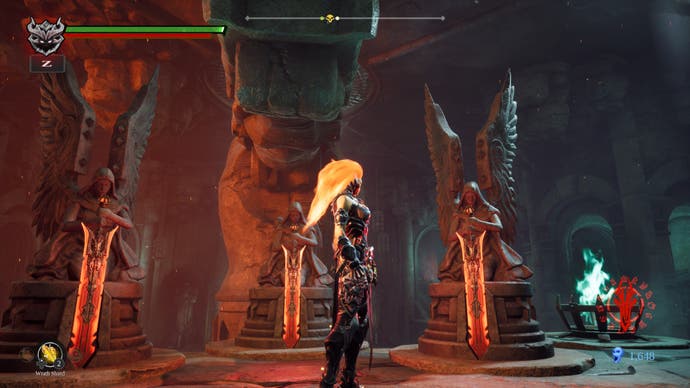
It's all a case of retreading old ground - understandably enough, since Fury is back on earth, and a lot of the locales feel familiar from the first Darksiders. Clearly a lot of effort went into sprucing caverns up where possible, but revisiting Manhattan's canalisation and toppled skyscrapers can feel a bit too much like 2010 for my liking. The boss and character design on the other hand has always been great, and Darksiders 3 is no exception.
I've always had a good time with Darksiders, because there's flow to its action and the whole experience never demands a lot of you. Darksiders 2 went out to innovate, but it seems its relative failure has prompted the need for something safe. You could always accuse the series of engaging in excess - it's been too dramatic, a patchwork of too many ideas - but the alternative is worse. There aren't many rewards to unlock, few things to discover and none of the narrative urgency both prior instalments had going for themselves.
If you like Darksiders, you can give it a go in the knowledge that it will immediately feel familiar, made by a team with a lot of love for the IP. However, the one point of criticism Darksiders has always had to contend with still holds true: you've seen all of what it has to offer before. I can now confidently say that Darksiders has done Darksiders better in the past.
